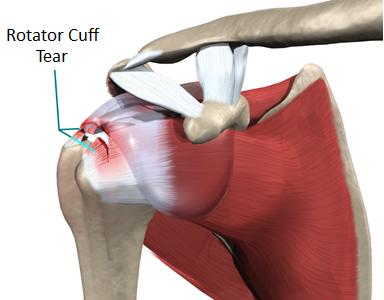
What is a rotator cuff injury?
A rotator cuff injury is a condition that can cause shoulder pain. The rotator cuff is made up of 4 shoulder muscles and their tendons. Tendons are strong bands of tissue that connect muscles to bones.
People can get different types of rotator cuff injuries. One common injury is “tendinopathy,” which is when people have a problem with 1 of their tendons. In most people with tendinopathy, the tendons are not inflamed or swollen. If they do get inflamed or swollen, doctors call it “tendinitis.” Tendinopathy and tendinitis can happen if people use their rotator cuff muscles too much or do a lot of activity with their arms overhead.
Another type of rotator cuff injury is a tear in a tendon. Tears can happen if a person falls on the shoulder or moves the shoulder too fast and with too much force. Tears can also happen as a tendon wears out over time.

What are the symptoms of a rotator cuff injury?
Most people with tendinopathy or tendinitis have pain around the tip of the shoulder and outer part of the upper arm. The pain is usually worse when they move their arm over their head or lie on their shoulder.
People with a torn tendon usually have shoulder pain and might also have weakness of the shoulder muscles.
Will I need tests?
You might need an imaging test of the shoulder such as an ultrasound or an MRI if a tear is suspected.
How is a rotator cuff injury treated?
Many rotator cuff injuries get better on their own, but they can take months to heal completely. To help your shoulder get better, you can:
- Rest your shoulder — Avoid doing any activities that strain your shoulder, such as raising your arm overhead or reaching behind you. In general, try to keep your arm down, close to, and in front of your body. But you can move your shoulder gently if you need to.
- Ice your shoulder — Put a cold gel pack, bag of ice, or bag of frozen vegetables on the injured area every 1 to 2 hours, for 15 minutes each time. Put a thin towel between the ice (or other cold object) and your skin.
- Take medicine to reduce the pain and swelling — Simple pain-killers such as paracetamol, Ibuprofen or Naproxen can be taken but it is recommended that you seek the advice of your family doctor before taking any medications.Some tears, especially large tears, might need to be treated with surgery.
Is there anything I can do on my own to feel better?
Yes. Early rotator cuff injuries are very responsive to physiotherapeutic treatments including interferential therapy, ultrasound treatment and shoulder strengthening exercises. See your pain specialist or your sports physician early for better results.
When you do shoulder exercises, it’s important to:
- Warm up your shoulder first by taking a hot shower or bath, or massaging the area
- Start slowly and make the exercises harder over time
- Know that some soreness is normal. If you have sharp or tearing pain, stop what you’re doing and let your doctor know.
What if my symptoms don’t get better?
If your symptoms don’t get better, it may be time to consult with
- A pain specialist for non-surgical interventional options
- An orthopedic surgeon for surgical or arthroscopic options
